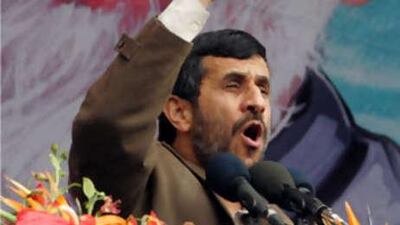Within a year of Mahmoud Ahmadinejad coming to power in 2005 there was talk in Tehran that his bull-in-a-china shop approach to foreign policy and domestic populism was seriously disturbing Iran's old guard. They feared the son of a humble blacksmith was jeopardising their vested political and financial interests while he unravelled a decade of diplomacy with the West and the Gulf Arab states. His rants against Israel were playing into the hands of Iran's enemies and heightening international concern about Tehran's nuclear programme.
Ephraim Halevy, the former head of Israel's Mossad spy agency, last week said: "Ahmadinejad is our greatest gift. He only serves us. We couldn't carry out a better operation at Mossad than to put a guy like Ahmadinejad in power in Iran. He unites the world against Iran." It was rumoured in Tehran's political circles three years ago that Ayatollah Ali Khamenei, the country's all-powerful supreme leader, would attempt to rein in the president and, if that failed, there could even be an attempt to remove Mr Ahmadinejad through impeachment.
But the resilient Mr Ahmadinejad survived. And now, with senior clerics and politicians berating his handling of the economy - inflation is galloping at 26 per cent - Ayatollah Khamenei has intervened to bolster the embattled Mr Ahmadinejad and silence his vociferous critics. Ayatollah Khamenei had given the president backing in the past. But the praise he offered Mr Ahmadinejad at the weekend was almost fulsome.
The supreme leader even urged the president to plan for a second four-year term: a statement of support that is likely to dismay potential challengers preparing for next year's presidential elections. "Do not think that this is your last year as head of the government," Ayatollah Khamenei urged Mr Ahmadinejad. "No. Act as if you will stay in charge for five years." The prospect of a second term for Mr Ahmadinejad is unlikely to inspire Americans and Iranians keen for an end to the animosity between their countries. Their hopes are also set on a new administration in Washington that would engage Iran and resolve the nuclear standoff peacefully.
Michael Axworthy, an Iran analyst at the Institute of Arab and Islamic Studies at Exeter University in England, said: "Khamenei is still trying to keep a balance. He's trying to pour oil on troubled waters." Speaking out in support of Mr Ahmadinejad now did not necessarily mean that the supreme leader was endorsing the president for a second term, he said. "But from Khamenei's point of view, Ahmadinejad looks like the best option," said Mr Axworthy, former head of the Iran desk at Britain's Foreign Office. "There are people around Khamenei who feel comfortable with the president. His revolutionary rhetoric legitimates their increasingly threadbare position. It's their only real claim to be there."
Certainly, Iranian conservatives were delighted by Ayatollah Khamenei's remarks. "Everyone has a duty to support a government which has come to power by a majority vote of the people and has been approved by the supreme leader," Asadollah Badamchian, a conservative parliamentarian, told the hardline Kayhan daily yesterday. Ayatollah Khamenei made clear that the back-to-revolutionary basics president was on his ideological wavelength. Mr Ahmadinejad's government had helped "revive" the values of the 1979 Islamic Revolution, Ayatollah Khamenei said. And he praised Mr Ahmadinejad for "blocking the infiltration of a westernisation trend in the government" - an implicit criticism of the reformist former president, Mohammed Khatami, who had sought closer ties to the West and attempted to liberalise Iranian society and politics.
Ayatollah Khamenei also hailed the president's tough stance on the nuclear issue, which has seen Iran slapped with three sets of UN Security Council sanctions and bracing for a fourth. The ayatollah called the government's defence of Iran's enrichment of uranium for nuclear fuel a symbol of the country's "national identity". Referring to western pressure on Iran to end the programme, Ayatollah Khamenei declared: "Some bullying and demanding countries wanted to impose their will on our country. But our people, and the president and his ministers, stood up to such demands."
There was one word of criticism from the ayatollah, however. While he gave general support for the president's economic initiative, which is aimed mainly at redirecting billions of dollars of state subsidies towards lower income groups, he warned against implementing it too hastily. "If part of this plan fuels inflation, a way must be found to prevent this or control any negative aspects," Ayatollah Khamenei said. Mr Ahmadinejad came to power on a populist platform promising to give the poor a fairer share of Iran's oil wealth and to tackle corruption. But prices and the unemployment rate has soared in the past two years.
Last week, Akbar Hashemi Rafsanjani, a powerful former president and leading pragmatic conservative, lashed out at Mr Ahmadinejad, a bitter rival, blaming him for gas shortages in winter and power cuts in summer. Local newspapers also quoted Mr Rafsanjani as telling university teachers that Ayatollah Khamenei asked him and other senior figures to tolerate Mr Ahmadinejad's government for some time but that the era of leniency was over.
But Ayatollah Khamenei, who arbitrates between Iran's various bickering power centres, has come decisively off the fence, signalling he wants an end to such increasingly vocal attacks on the president. The supreme leader, who likes to portray the regime as unified, said the constant negativity of Mr Ahmadinejad's critics was destructive and their personal animosity was blinding them to the president's achievements.
Mr Ahmadinejad, galvanised and relieved by the rare words of praise, said: "The exalted leader's approval of the government's direction is a shining medal on our hearts." @Email:mtheodoulou@thenational.ae
